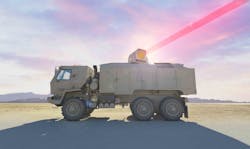Army asks industry to develop 300-kilowatt laser weapons to provide aerial defense for soldiers and bases
REDSTONE ARSENAL, Ala. – U.S. Army aerial defense experts are asking industry to develop prototype 300-kilowatt laser weapons to protect soldiers and installations from rockets, artillery shells, mortar rounds; unmanned aerial vehicles (UAVs); helicopters, fixed-wing aircraft, and even more stressing threats.
Officials of the Army Rapid Capabilities and Critical Technologies Office (RCCTO) at Redstone Arsenal, Ala., issued a call for white papers on Thursday for the three-year Indirect Fire Protection Capability-High Energy Laser (IFPC-HEL) Prototypes project.
High-energy laser weapons significantly help the Army defend against low-cost threats on the modern battlefield, such as drones. The IFPC-HEL project will develop enabling technologies to help Army leaders protect fixed and semi-fixed sites from rockets, artillery, mortars, UAVs, helicopters, fixed-wing aircraft, and similar threats.
Related: High-energy laser weapons move quickly from prototype to deployment
From industry, Army leaders want white papers that outline capabilities to build prototype 300-kilowatt laser weapons to disable or destroy these kinds of battlefield threats. Laser weapons prototypes must be at least as powerful as 250 kilowatts.
This effort will provide as many as four complete laser weapons that comprise beam control, beam director, battle management, power, and thermal management integrated onto an Army-furnished platform that incorporates an Army-directed laser weapon that will be identified by next October.
The aerial defense laser weapon systems prototypes must be delivered by summer 2024 for live range testing. Army leaders say they expect to award contracts to one or more companies to deliver high-energy laser weapons prototypes.
Related: At long last, laser weapons are nearing deployment
Companies interested should email white papers no later than 4 March 2022 to the Army's Joshua Flinn at [email protected]; James Bedsole at [email protected]; and Barbara Cantrell at [email protected]. Only U.S. companies with the ability to process and store secret information and hardware are eligible to submit a white paper.
Email questions or concerns no later than 11 Feb to Joshua Flinn at [email protected]; James Bedsole at [email protected]; and Barbara Cantrell at [email protected]. Companies that submit promising white papers will be invited to submit full proposals.
More information is online at https://sam.gov/opp/fe1cce00fde64c328b5234be24c795b1/view.
About the Author
John Keller
Editor-in-Chief
John Keller is the Editor-in-Chief, Military & Aerospace Electronics Magazine--provides extensive coverage and analysis of enabling electronics and optoelectronic technologies in military, space and commercial aviation applications. John has been a member of the Military & Aerospace Electronics staff since 1989 and chief editor since 1995.
